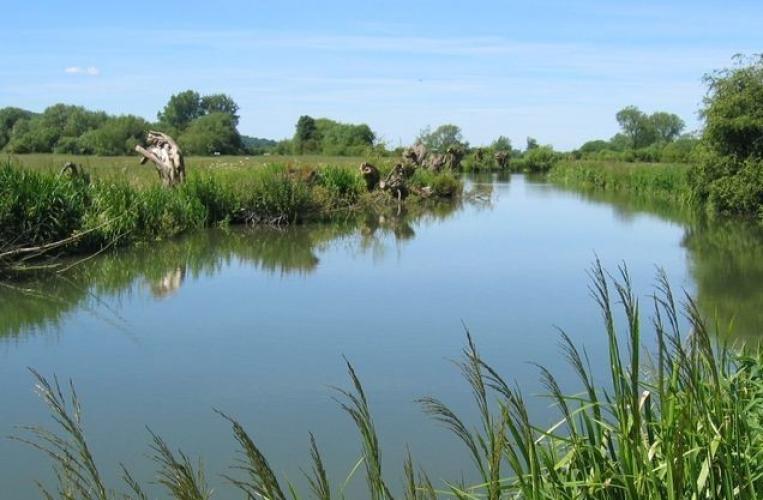You are here
- Home
- Biodiversity
- Why the plastic wet wipe ban is a step towards cleaning up our water quality
Why the plastic wet wipe ban is a step towards cleaning up our water quality

We spoke to Dr Kevin Collins, Senior Lecturer in Environment & Systems at The Open University, about the ongoing issue with water quality, and the Government’s recent move to ban ‘plastic’ wet wipes:
We all know that plastic in our rivers and our oceans is a bad idea. The Government has recently announced its intention to ban wet wipes as part of a wider strategy to help improve our rivers, coasts and seas.
Invented in the 1970s in the USA for customers of fast-food outlets, wet wipes are super convenient. They are a handy size and can be resealed. And because they are wet, they are ideal for cleaning ‘on the go’. Today there are wet wipes for everything: babies’ bottoms, mucky hands and faces, make-up removal, kitchen and bathroom surfaces, toys, car interiors. In fact, almost anything that just needs to be clean.
Once they’ve done their magic, many of us just put them down the toilet. Flush! Job done. High (now clean) fives!
So why is the humble and oh-so useful wet wipe being singled out?

Dr Kevin Collins
The simple answer is because many wet wipes contain plastic to make them strong and durable enough to cope with all those ‘grimy jobs’. We flush 11 billion wet wipes down the toilet every year. And that’s 11 billion problems for us, our rivers, our seas and our wildlife.
If you flush wet wipes down the toilet, they go straight into sewers. The plastic in the wet wipes does not dissolve. It gets broken into smaller and smaller bits and becomes so-called microplastics. While sewage treatment removes some of the microplastic, it is impossible to remove all of it. The microplastics eventually go into our rivers, affecting the plants and animals living there and eventually out to sea affecting our beaches and marine life.
The Governent wants to ban all plastics in wet wipes by 2024. Only plastic free wet wipes will be allowed for sale. The proposed ban is part of the government’s Plan for Water which aims to improve water quality in our rivers, lakes and seas in England and Wales.
Will the ban be enough?
Making wet wipes plastic free will certainly help reduce one source of microplastics entering our rivers and seas.
Already shops and manufacturers are switching to ‘plastic free’ wet wipes, with some makes claiming to be safe to flush or ‘flushable’.
But these claims are strongly disputed by environmental groups. Even the government is concerned that use of the term ‘flushable’ in advertising will just encourage people to continue to use the toilet as a bin. This is because flushing wet wipes of any type down the toilet still risks causing blockages in pipes and sewers, creating so-called ‘fatbergs’. These are large cement-like blockages of fats and fabrics and can cause sewage to overflow into nearby streams. Currently, according to UK Water, over 90% of sewer blockages are caused by wet wipes, costing billpayers in England and Wales £100m a year. As well as environmental damage, wet wipes damage our sewers and your wallet.
While the ban on wet wipes is welcome, our rivers and seas face many other sources of pollution from sewage, industry, agriculture, transport, and households. Under the Plan for Water, water companies in England and Wales will be required to make improvements to sewage treatment plants, reduce the amount of sewage entering our rivers and be subject to unlimited fines for pollution.
This is a step in the right direction in beginning to restore our rivers on which we depend for water, food, transport and recreation. And which are often a key part of our landscape, towns and cities.
But improvements will require water companies to rethink rivers and coasts as places for nature and people. It will also require proper resourcing of regulators such as the Environment Agency alongside a wider commitment by households, organisations and communities to help their river thrive. This will take time, effort and resources. Unfortunately, there is no magic wet wipe to clean up years of neglect and misuse of our rivers. But if we get it right, the rewards can be amazing: cleaner and healthier rivers, coasts and seas we can all be proud of.
So, if you want to start doing one thing to help prevent plastic in our rivers and seas, and to help keep our sewers fatberg-free, do not flush any type of wet wipe of any kind down the toilet. Even if says ‘plastic-free’ or ‘flushable’ on the packet.
Here’s an easy way to remember this for all toilets:
‘It has a lid, but it’s not a bin. Only pee, poo and paper should go in!’
Related articles
- Introducing a new free course - Climate Psychology: facing the climate crisis 8th February 2024
- Climate Change and machine learning - Climate Perspectives 8th February 2024
- Go Green: What is eco-anxiety? 8th February 2024
- Go Green: Fashion Fixing and Mending 8th February 2024
- OU rises in People and Planet League 13th December 2023